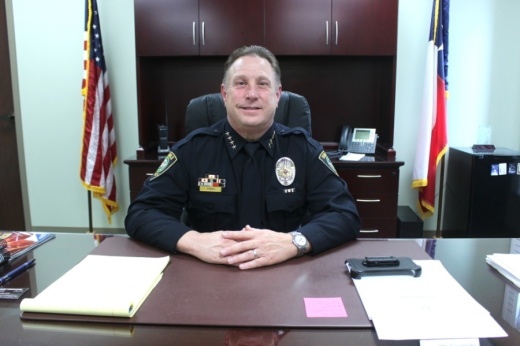When he was 19 years old, Theis decided to follow in his father’s footsteps and joined the University of Houston Police Academy. Upon graduation, he began his career as a part-time reserve officer in Humble in 1983, moving his way up through the ranks until he was promoted to assistant chief of police in 2017. He served in that role until former Chief Delbert Dawes retired.
What long-term goals do you have as chief of police for the department?
 I do want to put more of an emphasis on community policing efforts, on our police officers to get in the neighborhoods, meet our people, our citizens and develop a relationship with them to where they know us. ... Not that it’s way off base or anything, it’s just something we need to improve upon. ... The other development area I see here is we have to keep and maintain our relationship with our business owners and our business managers in the area. ... They have a unique group of issues that they deal with on a law-enforcement perspective, ... so we have to keep our relationship really upbeat with them to stay abreast of their issues.
I do want to put more of an emphasis on community policing efforts, on our police officers to get in the neighborhoods, meet our people, our citizens and develop a relationship with them to where they know us. ... Not that it’s way off base or anything, it’s just something we need to improve upon. ... The other development area I see here is we have to keep and maintain our relationship with our business owners and our business managers in the area. ... They have a unique group of issues that they deal with on a law-enforcement perspective, ... so we have to keep our relationship really upbeat with them to stay abreast of their issues.Are there any issues that need to be addressed in the community?
We have ... a target-rich environment for burglary of a motor vehicle and auto theft, just because we have tons of parking lots. That makes it an easy field for crooks to come to. ... But what we’re planning to do is [up] our proactive patrols in those areas to try to deter some of this. Granted, we know we can’t completely stop it, but at least put something out there to deter it as much as possible.
What have you learned at the department?
Some of the biggest things I’ve learned is the proper implementation of law-enforcement services to our citizens, the proper way to conduct business and deal with suspects of crimes, the importance of evidence, ... and the importance of following the proper protocols and procedures to have the proper ending to the proper prosecution. ... Sometimes it takes longer to do. Sometimes it’s not the way you want to do it, but there’s always reasons for why you follow the guidelines.
How often do officers undergo de-escalation training, and what does that training look like?
 Once every 24 months. ... They go through a course that teaches them procedures and strategies to de-escalate the situation, rather than have it turn into a possible use of force. They tried to go through a different scale of verbal compliance and try to talk the person down, rather than incite the person. ... I think [training every two years] is adequate enough.
Once every 24 months. ... They go through a course that teaches them procedures and strategies to de-escalate the situation, rather than have it turn into a possible use of force. They tried to go through a different scale of verbal compliance and try to talk the person down, rather than incite the person. ... I think [training every two years] is adequate enough.What is considered use of force by the department?
Use of force is anything above open-hand techniques. Taking someone to the ground and handcuffing them is not what we consider use of force. If there is a closed fist used, a baton, taser, pepper spray, anything like that triggers a use-of force-report to be completed. ... It’s not something at all that I condone whatsoever. ... I understand the officers have a job to do, but within parameters of what they’re doing, and excessive force is not one of them.
Is there anything else the community should know?
I just want them to know that we are their police department, and they have a group of excellent men and women that take care of them every day. We are very transparent; we’re very open; and anything they need please don’t hesitate to call. And we are looking forward to continue serving them to well into the future.





